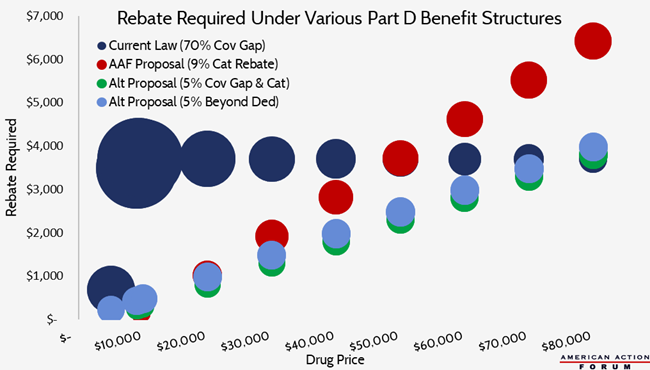Weekly Checkup
July 5, 2019
Five Questions About Price Transparency
This week, Christopher Holt explains in a brief video the intention behind encouraging price transparency in health care — as well as the challenges that come with such transparency.
Chart Review
Tara O’Neill Hayes, Deputy Director of Health Care Policy
Congress is considering reforms to the Medicare Part D benefit structure, including potentially changing the point in the program when drug manufactures must pay rebates for brand-name drugs and how much of a rebate must be paid. The following chart shows the amount of the rebate that would be required under various proposals, as well as the amount currently required by law, based on a drug’s price. The size of the bubble represents the amount of the rebate as a percentage of the drug’s price.
As you can see, current law is more punitive to lower-priced drugs—requiring a rebate equal to 39 percent of the price of a $9,000 drug but only 4.6 percent of the price of an $80,000 drug. In contrast, each of the proposals considered here (AAF’s proposal to require a 9 percent rebate in the catastrophic phase; a proposal to require a 5 percent rebate in both the coverage gap and catastrophic phase; and a proposal to require a 5 percent rebate for all costs beyond the deductible) would require a larger rebate as the price of the drug increases. New analysis from AAF further explains this dynamic as well as other potential implications of these reform proposals.
From Team Health
What Congress Needs to Consider When Reforming Medicare Part D
Tara O’Neill Hayes considers questions and alternatives to a proposed reform to Medicare Part D’s structure that would shift incentives for insurers and drug manufacturers.
Daily Dish: Developments in Proposed Part D Reform
AAF President Douglas Holtz-Eakin notes that any reform to Medicare Part D will come with tradeoffs and tough choices.
Daily Dish: Drug Price Arbitration
Douglas Holtz-Eakin examines the challenges and problems with any policy that would implement arbitration over what the government spends on drugs.
Worth a Look
The Hill: Study finds California’s vaccine laws helped reduce number of unvaccinated students
Reuters: Facebook to tackle content with misleading health claims











